Resources for Graduate Students in Mathematics
This page contains a number of resources for Graduate Students in Mathematics. Here is a list of the topics covered.
- Some Documents Containing Advice
- Advice and Thoughts on the Profession
- Professional Societies
- Online Resources for Research
- Attending and Giving Talks
- Mathematical Writing
- Teaching Experience
- Summer Programs for Graduate Students
- The Academic Job Search
- Harsh Realities
1. Some Documents Containing Advice
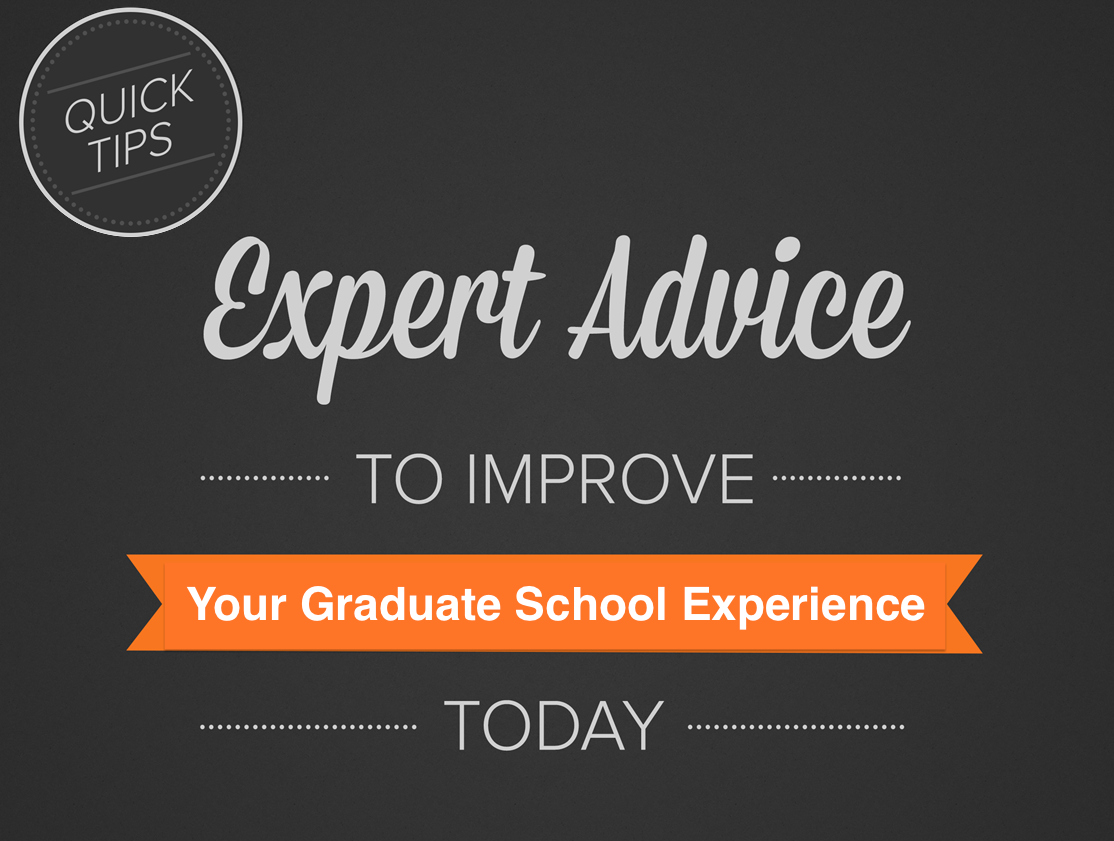
The following are a few (fairly detailed and lengthy) documents that contain advice about specific aspects of your graduate career.
After the Master's degree and before the Ph.D.
This is a Guide for Ph.D. Candidates in
Mathematics that I wrote for graduate students shortly
after earning my Ph.D. It contains advice for graduate students in
mathematics during the period of time after they pass qualifying exams
(or preliminary exams) and before receiving their Ph.D. In it you will find
suggestions on such topics as choosing an advisor, beginning to conduct
research, writing up results, and submitting papers for publication.
I've passed my quals, now what?
A guide for Ph.D. candidates in Mathematics
Having a Grand Project
I gave a talk at the UH Math Department's Graduate Student Seminar
advocating that every graduate student have a "Grand Project", something
special that you choose to work on to make a personal connection with and
contribution to mathematics. Here are the slides from my talk.
Having a Grand Project: Advice for
Graduate Students
The TA Handbook
If you have never been a Teaching Assistant (TA) for a class before, or
if you would like to be more effective in your teaching duties, take a look at
the TA Handbook published by the MAA.
"A Handbook for
Mathematics Teaching Assistants" by Tom Rishel
2. Advice and Thoughts on the Profession
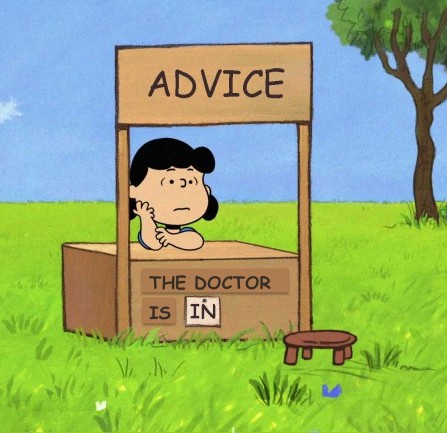
Advice from the Greats
Paul Halmos
Terence Tao
Freeman Dyson
- Missed
Opportunities by Freeman Dyson.
- Birds and Frogs, an essay by
Freeman Dyson that was written for his planned Einstein Public Lecture. In
it he divides mathematicians into two types: birds, who "fly high in
the air and survey broad vistas" (i.e., seek abstraction, unification, and
generalization), and frogs, who "see only the flowers that grow nearby"
(i.e., study the details of specific examples).
John Baez
Richard Hamming
- "You and Your Research", a talk
given by Richard Hamming that centered on the question "Why do so few
scientists make significant contributions and so many are forgotten in the
long run?". Hamming discusses what he has learned in terms of the
properties of individual scientists, their abilities, traits, working
habits, attitudes, and philosophies.
Sir Michael Atiyah
Steven G. Krantz
Uri Alon
Gian-Carlo Rota
Jean-Pierre Serre
Articles with Advice for Graduate Students
Thoughts on Doing Mathematics
3. Professional Societies
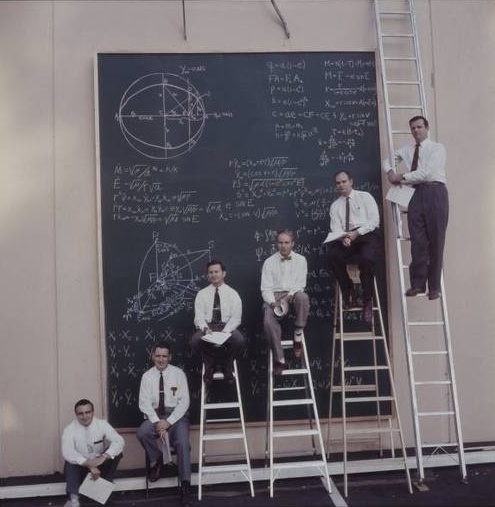 There are several professional societies for mathematicians. The two main professional societies are the AMS and MAA.
There are several professional societies for mathematicians. The two main professional societies are the AMS and MAA.
- The American Mathematical Society (AMS) is dedicated to the
interests of mathematical research and scholarship, and serves the national and international
community through its publications, meetings, advocacy and other programs.
- The Mathematical Association of America (MAA) works to
advance the mathematical sciences, especially at the collegiate level, through education, research,
professional development, public policy, and public appreciation of mathematics.
Sometimes the differences between the AMS and MAA are summarized as "The MAA is more concerned with mathematics education,
while the AMS is aimed more at professional mathematicians". While there is some truth in this, it is a large oversimplification. The
AMS and MAA are both interested in mathematics education at all levels as well as research mathematics, but their missions place
different emphasis on various issues within education and research.
As a graduate student, you should consider joining other professional societies as well.
Membership information
can be found on each society's website, and
you should be aware that the student rates for membership are
much cheaper than faculty rates.
As a member of a professional society, you
receive the monthly publications of the society, discounts on books and conference
registrations through that society, mathematics and society news,
information about mathematics opportunities, and access to certain online information.
Your membership also supports the mathematics community and
shows a level of professionalism that future employers like to see.
In addition to the AMS and MAA, some other popular mathematics societies with more specialized roles are the following:
- The Society for Industrial and Applied Mathematics (SIAM) exists to ensure the strongest
interactions between mathematics and other scientific and technological communities.
- The Association for Women in Mathematics (AWM) encourages
women and girls to study and have active careers in the mathematical sciences, and promotes equal
opportunity and the equal treatment of women and girls in the mathematical sciences.
- The American Statistical Association (ASA) is the nation's leading professional
association for statistics. Also see their Flyer
for Student Resources.
- The Society of Actuaries (SOA) is an educational, research, and professional
organization dedicated to serving the public and Society members. The SOA's vision
is for actuaries to be the leading professionals in the measurement and management of risk.
- The American Academy of Actuaries (AAA)
The American Academy of Actuaries is a professional association whose mission is to serve
the public and the U.S. actuarial profession. Academy members include consultants,
corporate executives and staff, regulators, government officials, academicians,
and retired actuaries. Their areas of practice cover pensions, life insurance, casualty
insurance, health insurance, financial reporting, risk management, and more.
Even if you are not a member of a particular society, their website can often be a source of very useful
information for you. In particular, the AMS and MAA both have a list of resources for students
on their websites, and these are accessible to everyone.
4. Online Resources for Research and Learning

Books and Papers
- The arXiv preprint server. Almost all
mathematicians post their preprints on the arXiv, as well as updates to the preprints. You can
search, browse the
new and
recent submissions, or
subscribe to a mailing list to
be updated on recent submissions. You can also do everything
by category. Once you have
decided on an advisor and research area, you should
subscribe to the arXiv mailing list in the relevant
categories. You will receive an email about once per week with all new submissions and
updated replacement submissions in your chosen categories. This is a great help for
keeping updated on progress and advancements in your field. (Note: The arXiv itself is located at
http://arxiv.org, but a front end that is
sometimes easier to navigate is maintained by UC Davis at
http://front.math.ucdavis.edu.)
-
MathSciNet. You can look up published papers and read reviews on MathSciNet, as well as
obtain information for bibliographies of papers you may be writing. If our library has
an electronic subscription to a journal, you can also access electronic copies of
papers through MathSciNet. (Note that MathSciNet requires a subscription, so to use it you must
login through the library using your CougarNet ID.)
-
The Mathematics Autodidact's Aid by Kristine K. Fowler is a list
of books for the autodidact (self-educated person)
published by the
AMS.
- My Own List of Textbook Recommendations for students
interested in learning various mathematical topics.
Answering Questions
- Math Stack Exchange is a question-and-answer
web site for math questions at any level.
- MathOverflow is a question-and-answer
web site for research-level math questions or other
questions of interest to professional mathematicians.
- Wikipedia actually has a
number of very well written articles on advanced mathematical topics. These articles can often
be used to answer basic questions. However, keep in ming that as with any
encyclopedia, Wikipedia is a starting point ---not an ending point--- for academic research.
Also, you may ask: "Should one cite Wikipedia in research papers?". Wikipedia says "no", and
here is a Wikipedia
article discussing the issue.
Advice for Reading Papers
Here is some advice for students reading papers for the first time:
- Begin with the abstract to see if you're interested.
- Read the introduction and conclusions with extra focus on the main ideas and results.
- Skim the middle sections to get a feel for the flow, pay special attention to main
theorems.
- Read select parts in more detail. Feel free to skip around depending on your level
of interest and how much detailed info you need.
- When an especially deep understanding is required, it may be necessary to go back
and read the entire article from start to finish.
5. Attending and Giving Talks
Attending Talks, Colloquia, and Seminars
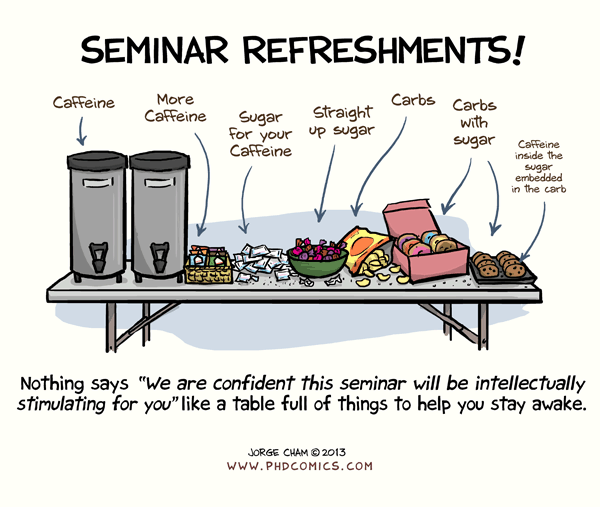 It is a good idea to attend colloquium talks as well as some of the
research seminars in your department. Although research seminars are usually fairly
specialized, in your first and second years of graduate school you can sample a few to
help you decide which area you want to go into. After you choose a research area
and advisor, it is likely that you will regularly attend a seminar series relevant to
your subject.
It is a good idea to attend colloquium talks as well as some of the
research seminars in your department. Although research seminars are usually fairly
specialized, in your first and second years of graduate school you can sample a few to
help you decide which area you want to go into. After you choose a research area
and advisor, it is likely that you will regularly attend a seminar series relevant to
your subject.
Unfortunately, many colloquia and seminar talks are often bad; usually because they are too technical
and difficult for non-experts to follow. Despite this, it is still beneficial for you and necessary for your
professional development that you attend them. (Remind yourself that one useful talk is often
worth attending ten bad talks.)
Try to get something out of every talk. Gain exposure to new ideas. Learn what topics are
at the forefronts of research right now. Learn the concepts and words that come up in
current research. Learn (perhaps by counterexample) what the
elements of a good talk are. In addition, strive to understand at least some small part of
every talk you attend. Here is some advice for doing so:
Giving Talks and Presenting Your Work
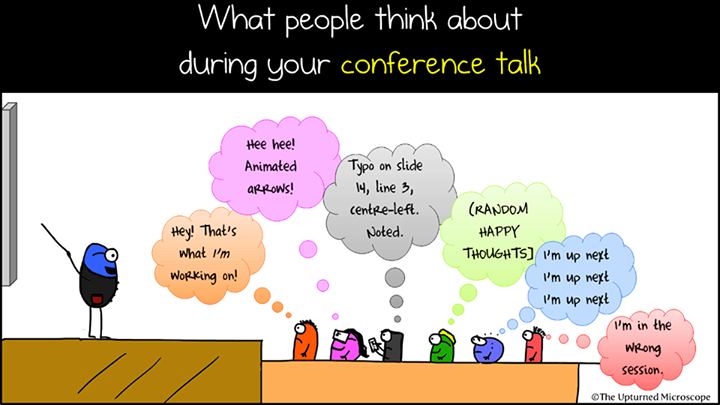 To have a career in mathematics you will need to give frequent talks on
your work. The following are several guides containing suggestions
for giving an effective mathematics talk.
To have a career in mathematics you will need to give frequent talks on
your work. The following are several guides containing suggestions
for giving an effective mathematics talk.
6. Mathematical Writing
 Here are some resources for Mathematical Writing.
Here are some resources for Mathematical Writing.
7. Teaching Experience
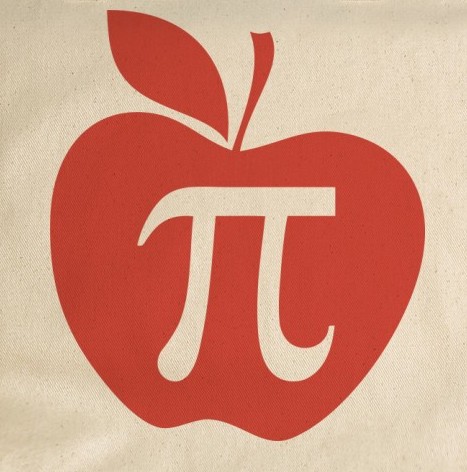 If you are planning on having a career in academia (even one with a large research component), then
teaching will be an important part of your future duties.
If you are planning on having a career in academia (even one with a large research component), then
teaching will be an important part of your future duties.
Summer Teaching Opportunities
If you want to use the summer to gain teaching experience, there are many K-12 mathematics
summer programs that seek (and pay) graduate students and faculty to assist with teaching.
Here are a few:
Teaching Resources
Some Advice as You Develop Your Teaching Skills
- In addition to lecturing, experiment with
nontraditional teaching methods; e.g., discovery-based learning,
inquiry-based learning, modified Moore methods, group work, interactive techniques such as
the use of "clickers", assigning
projects or writing activities, or using technology in the classroom.
- Form a Teaching Group or Teaching Seminar; i.e., find a group of like-minded students, postdocs, or faculty
interested in teaching who would be willing to meet regularly to discuss
teaching methods and experiences in their classrooms that semester.
8. Summer Programs for Graduate Students
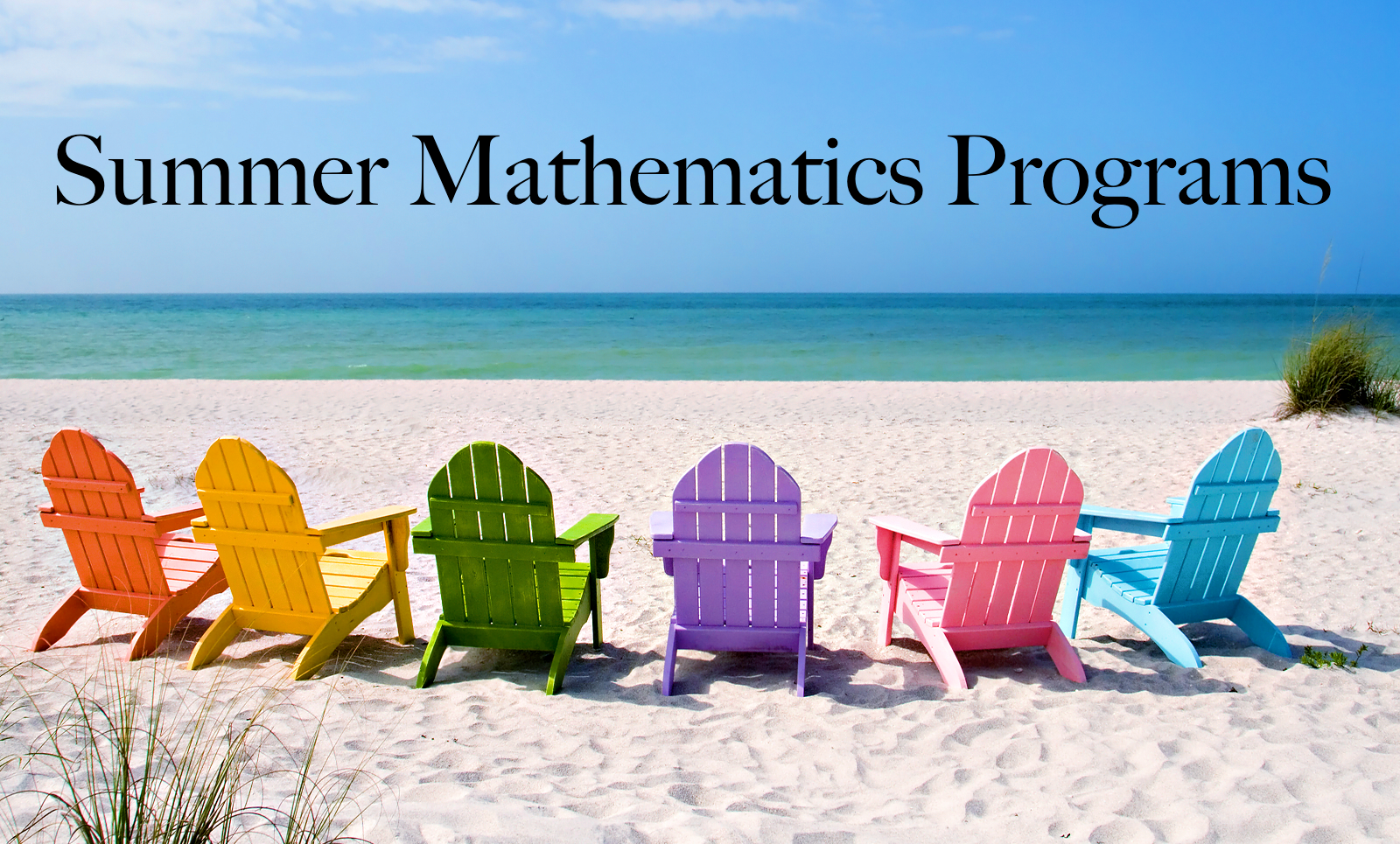
- The National Security Agency (NSA) has a
list of Programs for Graduate Students.
- Park City Math
Institute (PCMI) is a 3-week mathematics program held at Park City, Utah.
The mathematical topic changes from year to year. Participating groups
include mathematics educators, undergraduate students, graduate students, and
mathematics researchers. There are individual courses of study within each of
these groups, as well as a meaningful amount of interaction among the groups.
The rich mathematical experience
combined with interaction among all participants results in greatly
increased understanding and awareness of the issues confronting
mathematics and mathematics education today.
- AMS-AAAS
Mass Media Fellowship is a highly competitive program designed to improve public
understanding of science and technology by placing advanced science, mathematics, and engineering students
in newsrooms nationwide. Fellows work with media professionals to improve their communication skills and
increase their understanding of the editorial process by which events and ideas become news.
- AMS
Congressional Fellowship allows the fellow to spend a year working on the
staff of a Congress member or on a congressional committee, assisting in
legislative and policy areas that require scientific and technical input.
- Also see the Teaching Experience section for summer
programs that provide teaching experience.
9. The Academic Job Search

Here is a page with advice for students applying for academic jobs.
Advice for the Academic Job Search
Students who are interested in non-academic jobs should refer to
SIAM's list of
Careers in Applied Mathematics.
10. Harsh Realities
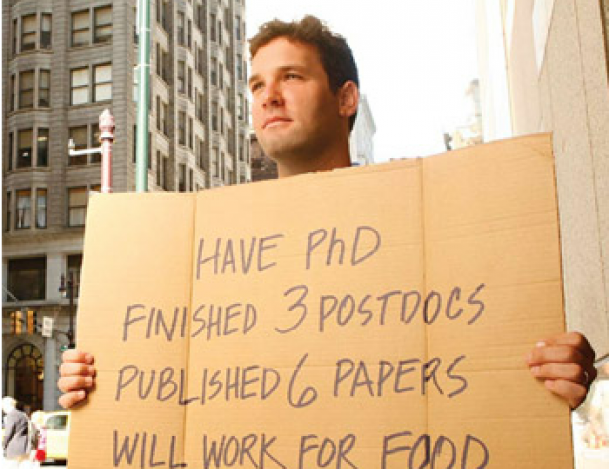
"[O]f all the machines that humanity has created, few
seem more precisely calibrated to the destruction of
hope than the academic job market." ---Dr. Patrick Iber (At the time he wrote these words, Dr.
Iber had a Ph.D. from the University of Chicago, a book
contract with Harvard University Press, and a visiting
lectureship at UC Berkeley.)
The drop-out rate in mathematics graduate programs throughout the U.S. is high,
and the academic job market for Ph.D.s is highly competitive.
Furthermore, in academic jobs, the path to tenure has become longer and more difficult
over the past few decades. More positions require postodctoral experience, there is
greater emphasis placed on obtaining grants and
external funding, and typical number of years to earn tenure and promotion has increased.
In addition, the hiring of more and more adjunct faculty and
lecturers has led to a decrease in the number of faculty positions and more
exploitation of academics with Ph.D.s.
It is important to be aware of these issues and prepare for them The
information here is meant to help you, not to discourage you. It is intended to help you make
an accurate assessment of the current state of graduate programs and job markets for Ph.D.s, so
that you can make informed decisions and plan for the future. It is important for all
graduate students to start
preparing for jobs and gaining skills to make themselves marketable in the
early stages of their graduate career, long before earning their degree and applying for jobs.
Thoughts on Graduate School
The Adjunct Crisis
Data on the Profession
- If you look at the "Mathematics" row in the following chart of
Data on Doctorates Awarded, you can see that the number of
mathematics Ph.D.s awarded in the U.S. (to both U.S. citizens and non-U.S. citizens) was 1,050 in 2000
and increased steadily to 1,554 in 2009. In addition, the following
report from the AMS shows there
were 1,957 Ph.D.s awarded in 2017. Note that this means the number of Ph.D.s awarded
from 2000 to 2017 has approximately doubled. Considering the rapid rate at which
the number of mathematics Ph.D.s awarded is increasing, combined with the fact that
the number of jobs
(particularly tenure-track faculty positions) for mathematics Ph.Ds is decreasing, you
get a sense of the difficulties in the mathematics Ph.D. job market.
- The AMS site with data
on the profession contains data and
statistics on mathematics education, PhD production, faculty size and
salaries, employment trends, and demographics in the Annual Survey, the CBMS Survey,
and other government data reports.
- The
Mathematical and Statistical Sciences Annual Survey
collects information each year from departments in the mathematical
sciences at four-year colleges and universities in the United States.
The column on the left of this site allows one to see data and statistics related to
graduate students, Ph.D.s awarded, faculty, and salaries.
Postdoctoral Positions and Tenure
To get a tenure-track job at a research university, you will need to do at least one postdoc. The
following comic strips from Ph.D.Comics give you a sense of the
impermanence of these positions, and the uncertainty of future employment, as you try to get your next position.
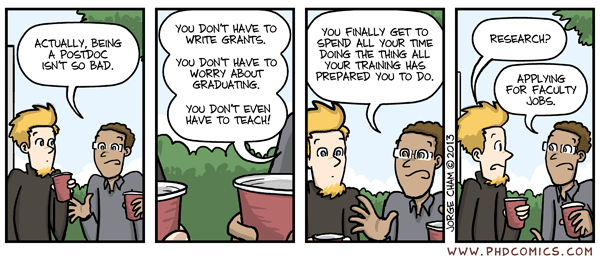
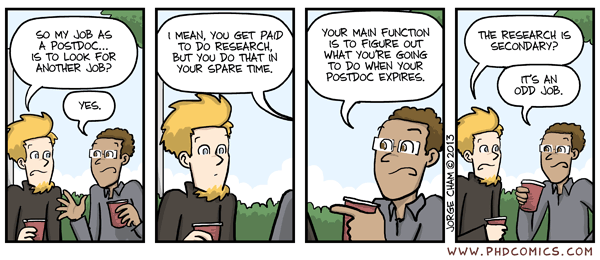
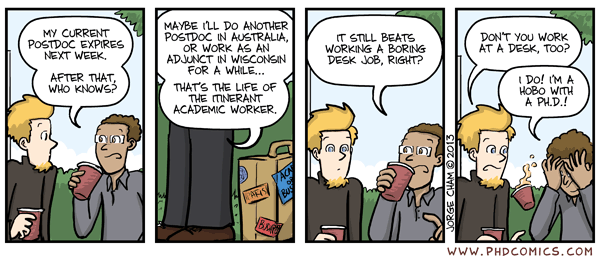
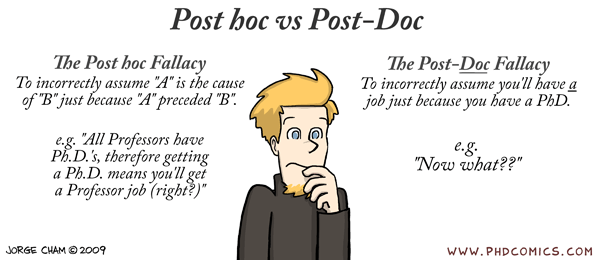
The Perils of Tenure
- "The Tenure Chase Papers" is a memoir by Dana Mackenzie about his candidacy for tenure at Kenyon College,
which ultimately ended with him being denied tenure and released from his position.
From author: "The Tenure Chase Papers" is a tale that is full of unexpected twists and turns and
good lessons for young professors on the tenure track. It draws back the veil of
secrecy surrounding the most critical career hurdle for anybody in academia.
It sometimes seems taboo to speak of tenure, but when things are left unspoken,
lessons are left unlearned. . . . I still think that there are very serious questions
about the wisdom of the tenure system.
Does this all-or-nothing hurdle make sense in the modern world? Suppose we concede for a
moment that universities should grant tenure only to faculty who are truly outstanding in
every way. Why should the penalty for being not-quite-outstanding be that you are essentially
fired? I don't know any other profession that conducts its business in such a self-defeating way.
The website www.phds.org said "[The Tenure Chase Papers] is required reading
for all academics and would-be academics". The full story was published in the book
Starting Our Careers (American Mathematical Society, 1999), pp. 79-100.
You can also read it on
Dana Mackenzie's Website or here:
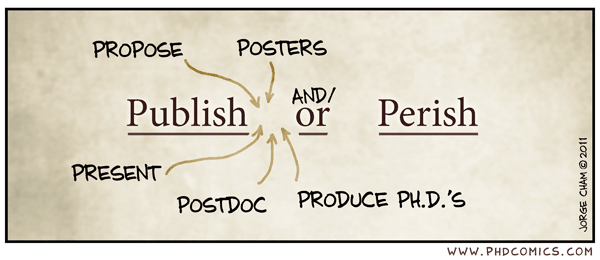
- To end on a slightly happier note, see the following article that suggests taking a positive attitude
during your time prior to the tenure review:
The Awesomest 7-Year Postdoc or: How I Learned to Stop Worrying and Love the
Tenure-Track Faculty Life from Scientific
American (also in PDF).
 Back
Back




 There are several professional societies for mathematicians. The two main professional societies are the AMS and MAA.
There are several professional societies for mathematicians. The two main professional societies are the AMS and MAA.

 It is a good idea to attend colloquium talks as well as some of the
research seminars in your department. Although research seminars are usually fairly
specialized, in your first and second years of graduate school you can sample a few to
help you decide which area you want to go into. After you choose a research area
and advisor, it is likely that you will regularly attend a seminar series relevant to
your subject.
It is a good idea to attend colloquium talks as well as some of the
research seminars in your department. Although research seminars are usually fairly
specialized, in your first and second years of graduate school you can sample a few to
help you decide which area you want to go into. After you choose a research area
and advisor, it is likely that you will regularly attend a seminar series relevant to
your subject.
 To have a career in mathematics you will need to give frequent talks on
your work. The following are several guides containing suggestions
for giving an effective mathematics talk.
To have a career in mathematics you will need to give frequent talks on
your work. The following are several guides containing suggestions
for giving an effective mathematics talk.
 Here are some resources for Mathematical Writing.
Here are some resources for Mathematical Writing.
 If you are planning on having a career in academia (even one with a large research component), then
teaching will be an important part of your future duties.
If you are planning on having a career in academia (even one with a large research component), then
teaching will be an important part of your future duties.







